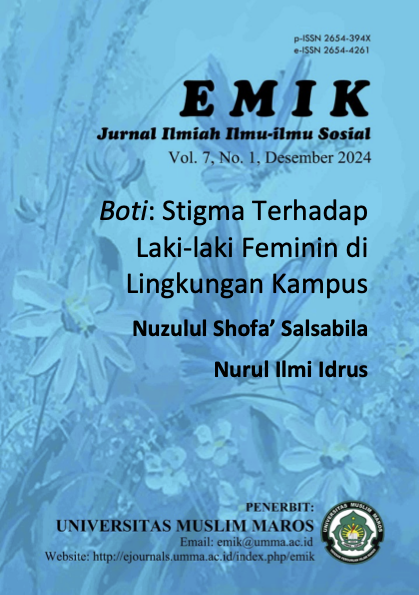Boti: Stigma Terhadap Laki-laki Feminin di Lingkungan Kampus
DOI:
https://doi.org/10.46918/emik.v8i1.2675Keywords:
feminine, men, stigma, boti, gender identity, expression, campusAbstract
The phenomenon of feminine men who do not conform to hegemonic masculinity norms is often subject to social stigma, particularly through negative labelling, such as the term boti. This study aims to explore the responses of feminine men to such stigma, understand the campus environment’s perception of their identities, examine the construction of gender identity within campus social spaces, and analyze the social impact of stigmatization.
This research uses a qualitative approach with a case study method and narrative analysis to explore the experiences of victims of stigma and the social interaction patterns that influence them. Data were collected through interviews with ten informants, consisting of four feminine male students (victims of stigma), two students who perpetrated the stigma, two members of the academic staff (lecturers), and two other students.
The findings reveal that feminine men respond to stigma in various ways, including rejecting the label, adapting to the social environment, ignoring the stigma, and accepting it as a form of self-affirmation. The impacts caused by stigma include: labeling and exclusion, social pressure, identity conflict and discomfort in social relations, and the emergence of alternative social dynamics that are exclusive and defensive. The social pressure not only affects their psychological well-being, but also impacts their interpersonal relationships and academic performance. Some experience tension of identity, while others manage to build supportive social spaces. This study emphasizes the importance of creating an inclusive campus environment not merely by promoting tolerance, but by fostering mutual understanding. Through constructive dialogue, campuses can become spaces that promote equality and solidarity for diverse gender expressions
References
Ariyanto, T. 2022, Agustus 15. Duduk Perkara Mahasiswa Unhas Pilih Gender Netral, Diusir Dosen Dari Ospek. https://www.detik.com/sulsel/berita/d-6246639/duduk-perkara-mahasiswa-unhas-pilih-gender-netral-diusir-dosen-dari-ospek?single=1, diakses tanggal 28 Mei 2025.
Azzahra, T. F. & Setiawan, R. 2024. “Dilema Ekspresi Gender: Strategi Mahasiswa Berperilaku Kemayu dalam Menavigasi Kehidupan di Lingkungan Kampus X,” Innovative, 1(1):1-10, https://j-innovative.org/index.php/Innovative/article/view/12813/10021, diakses tanggal 18 Oktober 2024.
Butler, J. 1988. “Performative Acts and Gender Constitution: An Essay in Phenomenology and Feminist Theory,” Theatre Journal, 40(4):514-520, https://www.jstor.org/stable/3207893?seq=1, diakses tanggal 21 Mei 2025.
Davies, S.G. 2011. Gender Diversity in Indonesia. London: Routledge.
Goffman, E. 1963. Stigma: Notes on the Management of Spoiled Identity (PDF ebook sample), https://cdn.penguin.co.uk/dam-assets/books/9780241548011/9780241548011-sample.pdf, diakses tanggal 14 Oktober 2024.
Husnullail, M., Risnita, R., Jailani, M. S., & Asbui. 2024. “Teknik Pemeriksaan Keabsahan Data dalam Riset Ilmiah,” Jurnal Genta Mulia, 15(2):72–73, https://ejournal.uncm.ac.id/index.php/gm/article/view/1148/721, diakses tanggal 04 Juni 2025.
Inayah, Z. R., & Fauzi, A. M. 2024. “Pembebasan Seksualitas dan Gender dalam Film The Danish Girl: Studi Analisis Teori Performativitas Judith Butler,” Paradigma, 13(01):133, https://ejournal.unesa.ac.id/index.php/paradigma/article/download/60106/46589, diakses tanggal 4 Juni 2025.
Kusnandar, J. A. 2023. “Stigma Maskulinitas di Tengah Budaya Patriarki Analisis Teori Solidaritas Sosial Emile Durkheim,” Lentera, 3(1):26-49. https://journal.unesa.ac.id/index.php/JOFC/article/view/17759/9600, diakses tanggal 18 Oktober 2024.
Oktyandito, Y. W. 2024. Arti Kata Boti dan Asal-Usulnya Dalam Istilah Gaul, https://www.idntimes.com/men/attitude/yogama-wisnu-oktyandito/arti-kata-boti, diakses tanggal 14 Oktober 2024.
Prawiranegara, T. P., Meiza, A., & Gamayanti, W. 2023. “Pengaruh Konflik Peran Gender Laki-Laki Dewasa Terhadap Strategi Koping,” JoPS: Journal of Psychology Students, 2(2):97–98, https://journal.uinsgd.ac.id/index.php/jops/article/download/33405/10430, diakses tanggal 21 Mei 2025.
Ramdani, M. F. F.; Putri, A. V. I. C.; & Wisesa, P. A. D. 2022. “Realitas Toxic Masculinity di Masyarakat,” Prosiding Seminar Nasional Ilmu-Ilmu Sosial (SNIIS) 2022, 230-235, https://proceeding.unesa.ac.id/index.php/sniis/article/download/60/46, diakses tanggal 16 Oktober 2024.
Ramli, U. & Basri, L. 2021. “Peran Gender Pada Masyarakat Bugis,” Jurnal Noken, 7(1):87-88, https://ejournal.um-sorong.ac.id/index.php/jn/article/download/1524/pdf/4389, diakses tanggal 14 Oktober 2024.
Riessman, C. K. 2005. “Narrative Analysis,” dalam N. Kelly, C. Horrocks, K. Milnes, B. Roberts, & D. Robinson (eds.), Narrative, Memory & Everyday Life, 3–5, https://eprints.hud.ac.uk/id/eprint/4920/2/Chapter_1_-_Catherine_Kohler_Riessman.pdf, diakses tanggal 26 Mei 2025.
Risky, P. A. 2023. “Bullying Sebagai Bentuk Resistensi Terhadap Toxic Masculinity di Kalangan Remaja,” Endogami, 7(1):62-75. https://ejournal.undip.ac.id/index.php/endogami/article/view/55893, diakses tanggal 16 Oktober 2024.
Romdona, S., Junista, S. S., & Gunawan, A. 2023. “Teknik Pengumpulan Data: Observasi, Wawancara dan Kuesioner,” Jisosepol: Jurnal Ilmu Sosial Ekonomi dan Politik, 3(1):39-47, https://samudrapublisher.com/index.php/JISOSEPOL/article/view/238, diakses tanggal 25 Mei 2025.
Sambayang, Z. F., Nurkhamiden, A. A., & Minabari, F. 2024. “Gender dan Kebudayaan: Analisis Antropologi,” Jurnal Interdisipliner Sosiologi Agama (JINSA), 4(2):153-160, https://ejournal.iain-manado.ac.id/index.php/jinnsa/article/view/1277, diakses tanggal 25 Mei 2025.
Zaidan, A. & Yoenanto, N. H. 2024. Gambaran Resiliensi pada Laki-laki Feminin yang Pernah Mengalami Bullying. Tesis, Universitas Airlangga https://repository.unair.ac.id/133430/, diakses tanggal 16 Oktober 2024.
Zaman, S. 2023. Mengapa Maskulinitas Hegemonik Penting Dalam Masyarakat Modern? https://psga.uin-malang.ac.id/psga_admin/opini-lelaki/mengapa-maskulinitas-hegemonik-penting-dalam-masyarakat-modern/, diakses tanggal 14 Oktober 2024.

Downloads
Published
Issue
Section
License
Copyright (c) 2025 Nuzulul Shofa' Salsabila, Nurul Ilmi Idrus

This work is licensed under a Creative Commons Attribution-ShareAlike 4.0 International License.








9.png)















